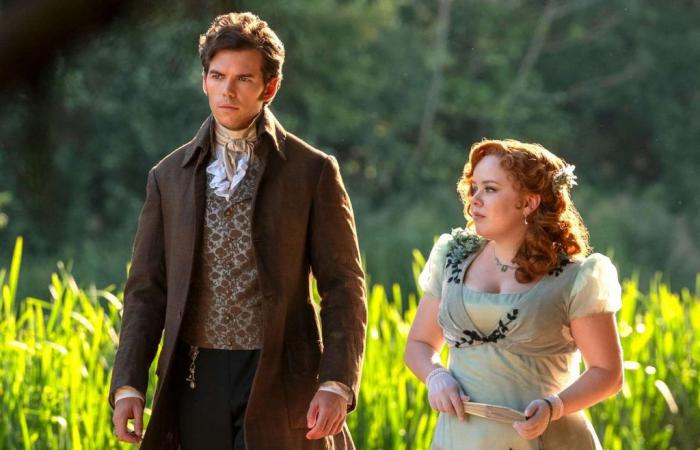Few things are as engaging on the screen as good unresolved sexual tension. That ‘yes, but no’ between friends who don’t know or don’t recognize that they’re making friends; that game of looks, approaches and discoveries; that desire that is repressed for the sake of friendship… We have seen it in films like When Harry Met Sally, My Best Friend’s Wedding and series like Bones or Castle have exploited it. Now, Bridgerton fans have finally been able to reach the climax at the same time as two of its protagonists, who have finally crossed the bridge that goes from friendship to love. The bridge of sex.
In the period series created by Shonda Rhimes, based on Julia Quinn’s romantic saga, the viewer witnesses how the relationship of best friends between Penelope and Colin is, in reality, clouded by the attraction she feels towards him. And how the different plot twists cause Colin to also feel attracted to that girl whom he had never looked at with the eyes of desire until culminating in a fiery scene in a carriage in which everything finally explodes.
Beyond an argument by Corín Tellado or Megan Maxwell, falling in love between friends is more present in everyday life than is usually thought. In an interesting article, published in Social Psychological and Personality Science, the social psychologist Danu A. Stinson states that studies and research have focused “overwhelmingly on the romance that develops between strangers and have largely overlooked that which develops between friends.” And it is not because this love between friends was rare, since, according to his meta-analysis, two thirds of the participants would have began their love relationship after a first stage of friendship.
Two types of intimacy
Psychologists who have studied relationships have long understood, Stinson notes, that “there are at least two types of intimacy. One is friendship-based intimacy, which is a cognitive and emotional experience comprising psychological interdependence, warmth and understanding, related to companionate love that nurtures long-term intimate bonds. The other is intimacy based on passion, which is a primarily emotional experience comprising romance and positive excitement, related to the passionate love that typifies novel and often sexual relationships.”
The dominant dating script talks about it being passionate desire that triggers interaction between potential romantic partners. That is, you feel sexually attracted to someone, and that someone to you, and you give free rein to that passion. And perhaps, from there, a loving bond will be established that takes that relationship to another dimension.
But this is not always the case, far from it. “Attraction between friends, falling in love that goes beyond friendship, is extremely common,” says psychologist Esther Cantos, who also warns that “this does not mean, far from it, that it cannot exist. a friendship between a heterosexual man and woman or among homosexual friends.”
Fear of recognizing it
It exists, but it is often hidden. “The fear of acknowledging romantic feelings toward a best friend is multifaceted and can be influenced by different factors, which can make a person feel trapped between the desire to be honest and the fear of possible consequences”. Among these factors why a person may not recognize that he is in love or is attracted to his best friend are the following:
- Fear of rejection: Revealing your feelings can make you feel vulnerable. The fear that your friend won’t feel the same way and will reject you can be paralyzing and intense, especially if that friendship is very valuable to you.
- Risk of losing friendship: There is also a fear that, by confessing what one really feels, the dynamics of the friendship will change forever. If the feeling is not reciprocated, tension may arise that makes you feel uncomfortable.
- Anxiety: Uncertainty about your friend’s feelings and how he or she will react can cause anxiety. This ambiguity may make you prefer to keep your feelings secret to avoid facing an unknown and potentially painful situation.
- Fear of social judgment: Social norms and expectations can also influence the fear of confessing feelings. You may worry about how others will see you if the relationship does not progress romantically or if the friendship deteriorates.
- Self-concept and self-esteem: A person with low self-esteem may doubt their worth or feel insecure about their romantic attractiveness. These internal doubts can cause them to avoid expressing their feelings to protect themselves from the potential humiliation of rejection.
- Confusion of feelings: Sometimes it is not easy to distinguish between platonic and romantic love, especially when the relationship is very close and deep. This internal conflict can lead to indecision and fear of acting according to the dictates of the heart.






